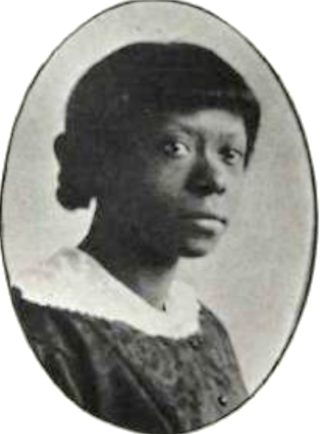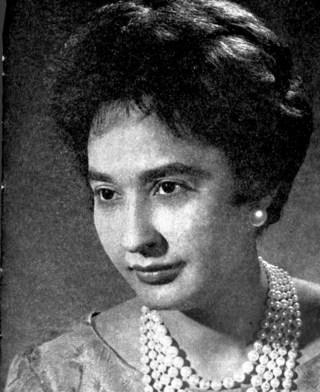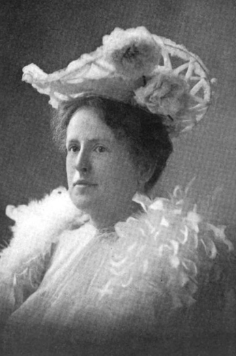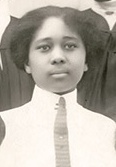
Sadie Tanner Mossell Alexander was a pioneering Black professional and civil rights activist of the early-to-mid-20th century. In 1921, Mossell Alexander was the second African-American woman to receive a Ph.D. and the first one to receive one in economics in the United States. In 1927, she was first Black woman to receive a law degree from the University of Pennsylvania Law School and went on to become the first Black woman to practice law in the state. She was also the first national president of Delta Sigma Theta sorority, serving from 1919 to 1923.

Delta Sigma Theta Sorority, Inc. (ΔΣΘ) is a historically African American sorority. The organization was founded by college-educated women dedicated to public service with an emphasis on programs that assist the African American community. Delta Sigma Theta was founded on January 13, 1913 by twenty-two women at Howard University in Washington, D.C. Membership is open to any woman, regardless of religion, race, or nationality. Women may apply to join through undergraduate chapters at a college or university or through an alumnae chapter after earning a college degree.
Myra Lillian Davis Hemmings was an American actress and teacher, and a founder of Delta Sigma Theta Sorority, Incorporated.

Bertha Pitts Campbell was a civil rights activist and one of the 22 founding members of Delta Sigma Theta Sorority, Inc.

Minnie Beatrice Smith was an American educator and an incorporator of Alpha Kappa Alpha, the first sorority founded by African-American women.

Ethel Jones Mowbray was one of the twenty founders of Alpha Kappa Alpha Sorority Incorporated, the first sorority founded by African-American women. Her legacy was an organization that has helped African-American women succeed in college, prepare for leadership and organize in communities, and serve their communities in later life. The sorority has continued to generate social capital for over 112 years.

Julia Evangeline Brooks was an incorporator of Alpha Kappa Alpha Sorority, Incorporated, the first sorority founded by African-American women. The sorority has continued to generate social capital for nearly 100 years.

Nellie Pratt Russell was an incorporator of Alpha Kappa Alpha Sorority, Incorporated, the first sorority founded by African-American college women. The sorority has continued to generate social capital for over 110 years.

Ethel Cuff Black was an American educator and one of the founders of Delta Sigma Theta sorority. She was the first African-American school teacher in Richmond County, New York.

Nellie May Quander was an incorporator and the first international president of Alpha Kappa Alpha Sorority, Incorporated. As president for several years, she helped expand the sorority and further its support of African-American women at colleges and in communities. The sorority established a scholarship endowment in her name. The legacy of the sorority has continued to generate social capital for over 112 years.

Winona Cargile Alexander was a founder of Delta Sigma Theta sorority, Incorporated at Howard University on January 13, 1913. It was the second sorority founded by African-American women and was influential in women's building civic institutions and charities. In 1915, she was the first African-American admitted to the New York School of Philanthropy, where she received a graduate fellowship for her studies. She was the first African-American hired as a social worker in New York.

Osceola Marie Adams, known professionally by the stage name Osceola Archer, was one of the first Black actresses to appear on Broadway in Between Two Worlds in 1934. Speaking of Adams' decade-long role as director of some three dozen productions at the Putnam County Playhouse, actor Carl Harms noted she was likely also the first African-American director of summer stock.
Marguerite Young Alexander an American eductor and was one of the founders of Delta Sigma Theta Sorority, Incorporated.

Jeanne Laveta Noble was an American educator who served on education commissions for three U.S. presidents. Noble was the first to analyze and publish the experiences of African American women in college. She served as president of the Delta Sigma Theta (DST) sorority within which she founded that group's National Commission on Arts and Letters. Noble was the first African-American board member of the Girl Scouts of the USA, and the first to serve the U.S. government's Defense Department Advisory Committee on Women in the Services (DACOWITS). She headed the Women's Job Corps Program in the 1960s, and was the first African-American woman to be made full professor at the New York University's Steinhardt School of Culture, Education, and Human Development.

Sarah Ida Shaw Martin was an American author, publisher, educator, and sorority founder. She founded the Delta Delta Delta sorority and was the author of The Sorority Handbook. She served as national president of two sororities -- Delta Delta Delta and Alpha Sigma Alpha. She also helped found and was chairman of the Association of Education Sororities.
Jessie McGuire Dent (1891–1948) was one of the 22 founders of the Black sorority Delta Sigma Theta. After graduation from Howard University, and years of teaching high school in her hometown of Galveston, Texas, she successfully sued the Galveston independent school district for unequal pay of Black teachers.

Naomi Sewell Richardson was an American educator and suffragist. She was a student co-founder of Delta Sigma Theta sorority, the second sorority founded for and by African-American women.
Dorothy Pelham Beckley was an American educator and clubwoman. She was the second national president of the Delta Sigma Theta sorority, in office from 1923 to 1926.













